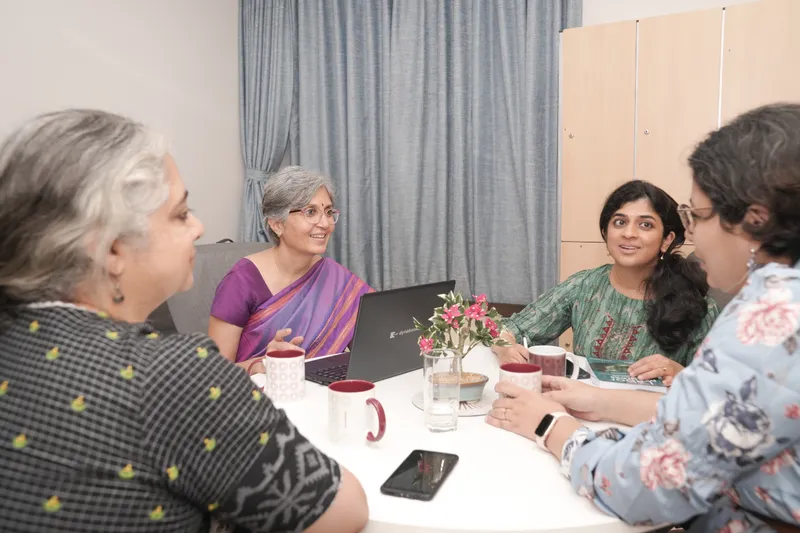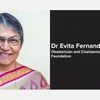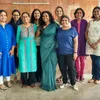Janhavi Nilekani is giving a big push to midwifery through awareness and training
Janhavi Nilekani, daughter of Infosys co-founder Nandan Nilekani and philanthropist Rohini Nilekani, is leading an initiative to establish midwifery as an essential component of maternal care—through a foundation, a digital learning platform, and a midwifery centre.
According to India’s fifth National Family Health Survey, done in two phases between June 2019 and April 2021, the national caesarean section (C-section) rate was a startling 21.5%, much higher than the World Health Organisation’s 'ideal rate’ of 10-15%.
On top of this is the disparity in the number of C-section births at government hospitals and private sector facilities. While 47.4% of babies born in the private sector were being delivered by surgical methods, the C-section rate was 14.3% in the government sector.
Empowering women and raising awareness about the benefits of normal childbirth and the implications of C-sections is the need of the hour, in the wake of a rise in C-section surgeries, especially in the urban milieu. Midwifery care is another way to reduce medical intervention in low-risk pregnancies, and this is what Janhavi Nilekani, a social entrepreneur, is working on.
Leading from the front
A development economist from Harvard, Janhavi, Founder of Bengaluru-based Aastrika Foundation and Aastrika Midwifery Centre, is working on bringing midwifery care to the centre stage. She talks to HerStory about the need to establish midwifery as an essential component of maternal care and the challenges she faced along her journey in this space.
Janhavi says, “There are extremely high rates of C-sections, episiotomies, inductions, augmentations, formula feeding, and unnecessary NICU care in the country. When a woman is giving birth, she is at her most vulnerable state and unable to defend herself. What she needs are ethics and compassion. But women in India are disempowered largely.”
These are the issues she wants to tackle through education and empowerment.
Janhavi, who is the daughter of Infosys co-founder and Aadhaar architect Nandan Nilekani and philanthropist Rohini Nilekani, acknowledges her privileged background, which helped her take the plunge into social entrepreneurship. She was especially drawn to maternal healthcare after her own experience with midwife-led delivery in 2016.
“After all my searching in Bengaluru, I finally settled on Dr Vijaya Krishnan in Hyderabad, a certified professional midwife. I had been following her work for some time,” she says.

Janhavi Nilekani with her team of experts at Aastrika Midwifery Centre
A foundation for awareness
Driven by her desire to spread awareness on midwifery care, Janhavi established Aastrika Foundation in May 2019. Three years later, the foundation has 30 employees working on making midwifery an important part of childbirth and maternal care.
As part of the foundation, a digital learning platform named Aastrika Sphere was created in September 2020 for nurses and midwives anywhere in the world. The platform aims to help pre-service midwifery students learn essential skills and help in-service midwives to upskill and improve their competencies.
The foundation offers courses from United Nations Population Fund and Fernandez Foundation, among others.
The “biggest, impactful” programme, according to Janhavi, has been the one in partnership with Maternity Foundation and Indian Nursing Council. “Postpartum haemorrhage remains the leading cause of maternal death globally, and I’m proud that our course on active management of the third stage directly targets the leading cause of maternal mortality,” she says.
Nearly 8,000 learners, primarily from government hospitals in rural and urban areas across the country, have taken the course, with about 2,000 obtaining certificates.
The foundation is also funding the National Midwifery Training Institute at the state-run Vanivilas Women and Children Hospital in Bengaluru. Training is expected to begin later this year. Janhavi says, “We have international faculty members from Europe, three local faculty members, a project coordinator, and two senior members who are only working on this.”
Developing an ecosystem
In December 2018, the Government of India had come out with ‘Guidelines on Midwifery Services in India, 2018’, with the aim of improving the quality of care and ensuring respectful care for pregnant women and newborn babies. Through the programme, the government aims to establish a cadre of professional midwives who are skilled on par with the international standards set by the International Confederation of Midwives.
Janhavi calls this a huge step in the right direction and attributes the development to the alliance of like-minded individuals and organisations. She particularly credits Dr Evita Fernandez of Hyderabad-based Fernandez Foundation, who had spearheaded the midwifery initiative with the PROMISE Campaign way back in 2011 and committed to creating a national cadre of midwives. She also applauds the work of Dr Vijaya Krishnan and Priyanka Idicula, well-known midwives in India, for taking up midwifery advocacy in the country.

At Aastrika Foundation
Advocacy to practice
After four years of trying to establish a full-fledged facility in hospitals where pregnant women could avail themselves of midwifery-led care, Janhavi set up her own practice in the private sector—Aastrika Midwifery Centre—in 2021 in partnership with Vasavi Hospital in Bengaluru.
“We tried a lot of hospitals … In some cases, the management didn't want to do it, and, at other times, the obstetricians got upset saying I was challenging their method of functioning. It took a long time to find the right path. But the capacity of our parent hospital is amazing. It’s run by Vasavi Trust for income groups across different levels.”
The centre has an interdisciplinary team of obstetricians, midwives, paediatricians, and nurses. Aastrika’s midwives have earned their qualifications from Fernandez Foundation.
Aastrika Midwifery Centre’s services are priced from Rs 1.1 lakh to Rs 2.1 lakh. The premium package is priced at Rs 2.1 lakh. Asked if the services were affordable to the larger demographic, the social entrepreneur points out, “Right now, we are cheaper than what corporate hospitals offer.”
Janhavi describes Aastrika Midwifery Centre as an effort to establish professional midwifery advice in the private sector. She says that professional midwifery in India must go beyond just being a programme for women in government hospitals. “It needs to touch every woman in the country because there are huge maternal health challenges for wealthy women and women in private hospitals as well. Nearly one-third of births in our country—9 million births a year—happen in the private sector, and the quality of care in the private sector is quite abysmal from top to bottom.”
Baby steps to big strides
As a public policy practitioner working in public health, Janhavi has big plans for the future.
Aastrika Foundation is working on establishing simulation and skilling labs and clinical practice sites for midwifery training.
There are plans for Aastrika Sphere too. “We are using technology designed from the get-go to potentially reach two million to four million nurses and Asha workers. We intend for Aastrika Sphere to be available for each of them; even today, any nurse can log on to our website, make a profile, and avail of these courses, which are specifically designed for nurses, for free,” says Janhavi.
While there are plans to launch more midwifery-led centres in Bengaluru, Janhavi wants to wait for more fully qualified midwives to join the growing tribe. The Aastrika midwifery team is looking to establish a presence in a hospital for low-income groups to increase its reach.
With a foundation and a midwifery centre under her belt, Janhavi is mighty hopeful of the future. “We are genuinely trying to build demand for midwifery in this country, advocate, and convince women that they have a right to question what chain hospitals are telling them.”
(This story was updated to correct a typo.)
Edited by Swetha Kannan









